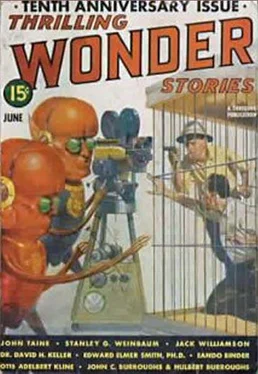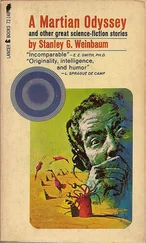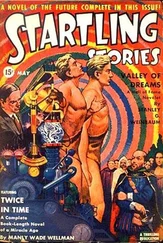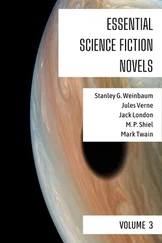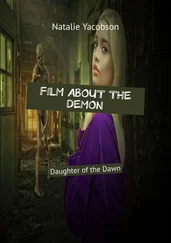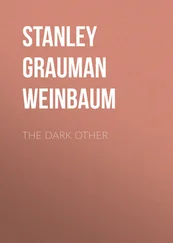Stanley Weinbaum - Dawn of Flame
Здесь есть возможность читать онлайн «Stanley Weinbaum - Dawn of Flame» весь текст электронной книги совершенно бесплатно (целиком полную версию без сокращений). В некоторых случаях можно слушать аудио, скачать через торрент в формате fb2 и присутствует краткое содержание. Жанр: Фантастика и фэнтези, на английском языке. Описание произведения, (предисловие) а так же отзывы посетителей доступны на портале библиотеки ЛибКат.
- Название:Dawn of Flame
- Автор:
- Жанр:
- Год:неизвестен
- ISBN:нет данных
- Рейтинг книги:5 / 5. Голосов: 1
-
Избранное:Добавить в избранное
- Отзывы:
-
Ваша оценка:
- 100
- 1
- 2
- 3
- 4
- 5
Dawn of Flame: краткое содержание, описание и аннотация
Предлагаем к чтению аннотацию, описание, краткое содержание или предисловие (зависит от того, что написал сам автор книги «Dawn of Flame»). Если вы не нашли необходимую информацию о книге — напишите в комментариях, мы постараемся отыскать её.
Dawn of Flame — читать онлайн бесплатно полную книгу (весь текст) целиком
Ниже представлен текст книги, разбитый по страницам. Система сохранения места последней прочитанной страницы, позволяет с удобством читать онлайн бесплатно книгу «Dawn of Flame», без необходимости каждый раз заново искать на чём Вы остановились. Поставьте закладку, и сможете в любой момент перейти на страницу, на которой закончили чтение.
Интервал:
Закладка:
"Yes. In Ozarky we spoke little of such things."
"Well," said the old man comfortably, "I will begin then, at what to us is the beginning, but to the Ancients was the end. I do not know what factors, what wars, what struggles, led up to the mighty world that died during the Dark Centuries, but I do know that three hundred years ago the world reached its climax. You cannot imagine such a place, Hull. It was a time of vast cities, too — fifty times as large as N'Orleans with its hundred thousand people."
He puffed slowly. "Great steel wagons roared over the iron roads of the Ancients. Men crossed the oceans to east and west. The cities were full of whirring wheels, and instead of the many little city-states of our time, there were giant nations with thousands of cities and a hundred million — a hundred and fifty million people."
Hull stared. "I do not believe there are so many people in the world," he said.
Old Einar shrugged. "Who knows?" he returned. "The ancient books — all too few — tell us that the world is round, and that beyond the seas lie one, or several continents, but what races are there today not even Joaquin Smith can say." He puffed smoke again. "Well, such was the ancient world. These were warlike nations, so fond of battle that they had to write many books about the horrors of war to keep themselves at peace, but they always failed. During the time they called their twentieth century there was a whole series of wars, not such little quarrels as we have so often between our city-states, nor even such as that between the Memphis League and the Empire, five years ago. Their wars spread like storm clouds around the world, and were fought between millions of men with unimaginable weapons that flung destruction a hundred miles, and with ships on the seas, and with gases."
"What's gases?" asked Hull.
Old Einar waved his hand so that the wind of it brushed the youth's brown cheek. "Air is a gas," he said. "They knew how to poison the air so that all who breathed it died. And they fought with diseases, and legend says that they fought also in the air with wings, but that is only legend."
"Diseases!" said Hull. "Diseases are the breath of Devils, and if they controlled Devils they used sorcery, and therefore they knew magic."
"There is no magic," reiterated the old man. "I do not know how they fought each other with diseases, but Martin Sair of N'Orleans knows. That was his study, not mine, but I know there was no magic in it." He resumed his tale. "So these great fierce nations flung themselves against each other, for war meant more to them than to us. With us it is something of a rough, joyous, dangerous game, but to them it was a passion. They fought for any reason, or for none at all save the love of fighting."
"I love fighting," said Hull.
"Yes, but would you love it if it meant simply the destroying of thousands of men beyond the horizon? Men you were never to see?"
"No. War should be man to man, or at least no farther than the carry of a rifle ball."
"True. Well, some time near the end of their twentieth century, the ancient world exploded into war like a powder horn in a fire. They say every nation fought, and battles surged back and forth across seas and continents. It was not only nation against nation, but race against race, black and white and yellow and red, all embroiled in a titanic struggle."
"Yellow and red?" echoed Hull. "There are a few black men called Nigs in Ozarky, but I never heard of yellow or red men."
"I have seen yellow men," said Old Einar. "There are some towns of yellow men on the edge of the western ocean, in the region called Friscia. The red race, they say, is gone, wiped out by the plague called the Grey Death, to which they yielded more readily than the other races."
"I have heard of the Grey Death," said Hull. "When I was very young, there was an old, old man who used to say that his grand-father had lived in the days of the Death."
Old Einar smiled. "I doubt it, Hull. It was something over two and a half centuries ago. However," he resumed, "the great ancient nations were at war, and as I say, they fought with diseases. Whether some nation learned the secret of the Grey Death, or whether it grew up as a sort of cross between two or more other diseases, I do not know. Martin Sair says that diseases are living things, so it may be so. At any rate, the Grey Death leaped suddenly across the world, striking alike at all people. Everywhere it blasted the armies, the cities, the countryside, and of those it struck, six out of every ten died. There must have been chaos in the world; we have not a single book printed during that time, and only legend tells the story.
"But the war collapsed. Armies suddenly found themselves unopposed, and then were blasted before they could move. Ships in mid-ocean were stricken, and drifted unmanned to pile in wreckage, or to destroy others. In the cities the dead were piled in the streets, and after a while, were simply left where they fell, while those who survived fled away into the country. What remained of the armies became little better than roving robber bands, and by the third year of the plague there were few if any stable governments in the world."
"What stopped it?" asked Hull.
"I do not know. They end, these pestilences. Those who take it and live cannot take it a second time, and those who are somehow immune do not take it at all, and the rest — die. The Grey Death swept the world for three years; when it ended, according to Martin Sair, one person in four had died. But the plague came back in lessening waves for many years; only a pestilence in the Ancient's fourteenth century, called the Black Death, seems ever to have equaled it.
"Yet its effects were only beginning. The ancient transport system had simply collapsed, and the cities were starving. Hungry gangs began raiding the countryside, and instead of one vast war there were now a million little battles. The weapons of the Ancients were everywhere, and these battles were fierce enough, in all truth, though nothing like the colossal encounters of the great war. Year by year the cities decayed until by the fiftieth year after the Grey Death, the world's population had fallen by three-fourths, and civilization was ended. It was barbarism now that ruled the world, but only barbarism, not savagery. People still remembered the mighty ancient civilization, and everywhere there were attempts to combine into the old nations, but these failed for lack of great leaders."
"As they should fail," said Hull. "We have freedom now."
"Perhaps. By the first century after the Plague, there was little left of the Ancients save their ruined cities where lurked robber bands that scoured the country by night. They had little interest in anything save food or the coined money of the old nations, and they did incalculable damage. Few could read, and on cold nights was usual to raid the ancient libraries for books to burn and to make things worse, fire gutted the ruins of all cities, and there was no organized resistance to it. The flames simply burned themselves out, and priceless books vanished."
"Yet in N'Orleans they study, don't they?" asked Hull.
"Yes, I'm coming to that. About two centuries after the Plague — a hundred years ago, that is — the world had stabilized itself. It was much as it is here today, with little farming towns and vast stretches of deserted country. Gunpowder had been rediscovered, rifles were used, and most of the robber bands had been destroyed. And then, into the town of N'Orleans, built beside the ancient city, came young John Holland.
"Holland was a rare specimen, anxious for learning. He found the remains of an ancient library and began slowly to decipher the archaic words in the few books that had survived. Little by little others joined him, and as the word spread slowly, men from other sections wandered in with books, and the Academy was born. No one taught, of course; it was just a group of studious men living a sort of communistic, monastic life. There was no attempt at practical use of the ancient knowledge until a youth named Teran had a dream — no less a dream than to recondition the centuries-old power machines of N'Orleans, to give the city the power that travels on wires!"
Читать дальшеИнтервал:
Закладка:
Похожие книги на «Dawn of Flame»
Представляем Вашему вниманию похожие книги на «Dawn of Flame» списком для выбора. Мы отобрали схожую по названию и смыслу литературу в надежде предоставить читателям больше вариантов отыскать новые, интересные, ещё непрочитанные произведения.
Обсуждение, отзывы о книге «Dawn of Flame» и просто собственные мнения читателей. Оставьте ваши комментарии, напишите, что Вы думаете о произведении, его смысле или главных героях. Укажите что конкретно понравилось, а что нет, и почему Вы так считаете.
